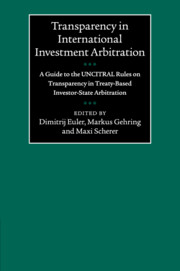 Transparency in International Investment Arbitration
Transparency in International Investment Arbitration Book contents
- Frontmatter
- Contents
- Contents
- List of contributors
- Foreword
- Acknowledgements
- Table of treaties, guidelines and rules
- Table of cases
- List of abbreviations
- 1 Introduction
- 2 Public interest in investment arbitration
- 3 Article 1. Scope of application
- 4 Article 2. Publication of information at the commencement of arbitral proceedings
- 5 Article 3. Publication of documents
- 6 Article 4. Submission by a third person
- 7 Article 5. Submission by a non-disputing Party to the treaty
- 8 Article 6. Hearings
- 9 Article 7. Exceptions to transparency
- 10 Article 8. Repository of published information
- 11 The application of transparency
- 12 Conclusion: The Rules as a swing of the pendulum?
- Index
5 - Article 3. Publication of documents
Published online by Cambridge University Press: 05 August 2015
- Frontmatter
- Contents
- Contents
- List of contributors
- Foreword
- Acknowledgements
- Table of treaties, guidelines and rules
- Table of cases
- List of abbreviations
- 1 Introduction
- 2 Public interest in investment arbitration
- 3 Article 1. Scope of application
- 4 Article 2. Publication of information at the commencement of arbitral proceedings
- 5 Article 3. Publication of documents
- 6 Article 4. Submission by a third person
- 7 Article 5. Submission by a non-disputing Party to the treaty
- 8 Article 6. Hearings
- 9 Article 7. Exceptions to transparency
- 10 Article 8. Repository of published information
- 11 The application of transparency
- 12 Conclusion: The Rules as a swing of the pendulum?
- Index
Summary
5.1 Introduction
1. Article 3 addresses the publication of documents. It comprises five paragraphs that largely deal with issues of process. Paragraph 1, for instance, sets out a list of documents that are to be automatically made available. Paragraph 2 identifies documents that are to be made available upon request by any person. Paragraph 3 gives the arbitral tribunal the discretion to make available documents not encompassed in paragraphs 1 or 2. This discretion can be exercised in response to a request from any person, or an act of the tribunal's own volition. Documents made available pursuant to paragraph 3 are not necessarily done so through the repository. Paragraph 4 addresses the relationship between the tribunal and the repository again from a process perspective. Paragraph 5 addresses the costs issues associated with any paragraph 3 documents.
2. Article 3 is not, then, itself an article that gives or grants a right of access to information. This article is drafted in a manner that, in the first instance, assumes such a right already exists in relation to certain documents (see here paragraphs 1 and 2 of Article 3), and may exist with respect to other documents. The right of access is established by the application of the Rules as a whole, which, with reference to the Arbitration Rules (2010), would be Article 1(4), as adopted in 2013. The reference in paragraph 5 to granting access should therefore be understood as ‘gaining’ access.
3. Article 3, like the Rules themselves, embodies, on the one hand, the culmination of steps towards transparency, but almost equally signifies a significant departure from what existed before. To reconcile these two seemingly opposite observations, a brief consideration of the background and context of document publication in arbitration, and particularly investment arbitration, is useful.
4. The general Arbitration Rules were principally and originally drafted with private commercial arbitration in mind. Yet despite this, they ‘are the second most used rules for resolving investor-States disputes’ (after the Arbitration Rules of the International Centre for Settlement of Investment Disputes (ICSID)). Given their original, and indeed continuing, purpose, the Arbitration Rules themselves do not promote transparency. Indeed, to the contrary, both versions clearly demonstrate a preference for privacy.
- Type
- Chapter
- Information
- Transparency in International Investment ArbitrationA Guide to the UNCITRAL Rules on Transparency in Treaty-Based Investor-State Arbitration, pp. 91 - 127Publisher: Cambridge University PressPrint publication year: 2015
